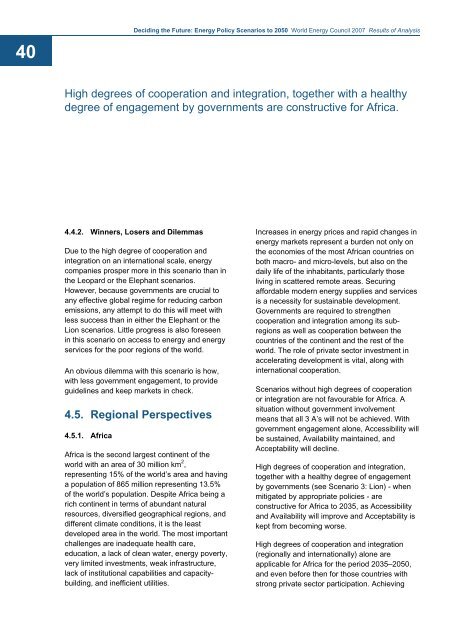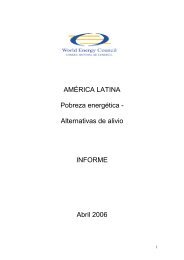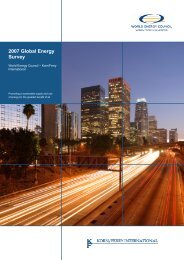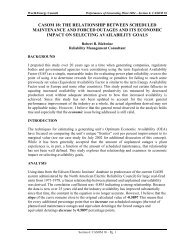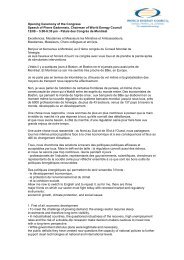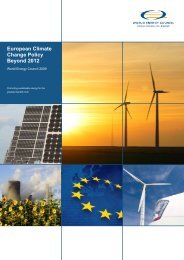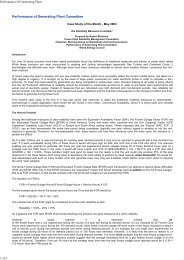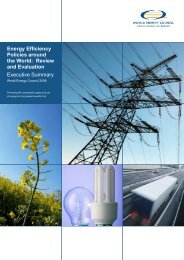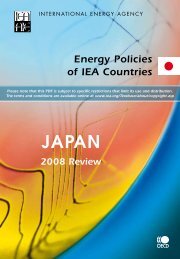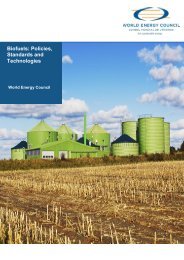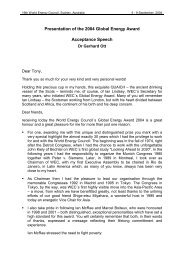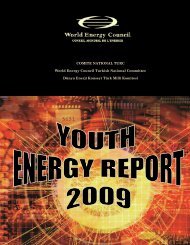Deciding the Future: Energy Policy Scenarios to 2050
Deciding the Future: Energy Policy Scenarios to 2050
Deciding the Future: Energy Policy Scenarios to 2050
You also want an ePaper? Increase the reach of your titles
YUMPU automatically turns print PDFs into web optimized ePapers that Google loves.
40<br />
<strong>Deciding</strong> <strong>the</strong> <strong>Future</strong>: <strong>Energy</strong> <strong>Policy</strong> <strong>Scenarios</strong> <strong>to</strong> <strong>2050</strong> World <strong>Energy</strong> Council 2007 Results of Analysis<br />
High degrees of cooperation and integration, <strong>to</strong>ge<strong>the</strong>r with a healthy<br />
degree of engagement by governments are constructive for Africa.<br />
4.4.2. Winners, Losers and Dilemmas<br />
Due <strong>to</strong> <strong>the</strong> high degree of cooperation and<br />
integration on an international scale, energy<br />
companies prosper more in this scenario than in<br />
<strong>the</strong> Leopard or <strong>the</strong> Elephant scenarios.<br />
However, because governments are crucial <strong>to</strong><br />
any effective global regime for reducing carbon<br />
emissions, any attempt <strong>to</strong> do this will meet with<br />
less success than in ei<strong>the</strong>r <strong>the</strong> Elephant or <strong>the</strong><br />
Lion scenarios. Little progress is also foreseen<br />
in this scenario on access <strong>to</strong> energy and energy<br />
services for <strong>the</strong> poor regions of <strong>the</strong> world.<br />
An obvious dilemma with this scenario is how,<br />
with less government engagement, <strong>to</strong> provide<br />
guidelines and keep markets in check.<br />
4.5. Regional Perspectives<br />
4.5.1. Africa<br />
Africa is <strong>the</strong> second largest continent of <strong>the</strong><br />
world with an area of 30 million km 2 ,<br />
representing 15% of <strong>the</strong> world’s area and having<br />
a population of 865 million representing 13.5%<br />
of <strong>the</strong> world’s population. Despite Africa being a<br />
rich continent in terms of abundant natural<br />
resources, diversified geographical regions, and<br />
different climate conditions, it is <strong>the</strong> least<br />
developed area in <strong>the</strong> world. The most important<br />
challenges are inadequate health care,<br />
education, a lack of clean water, energy poverty,<br />
very limited investments, weak infrastructure,<br />
lack of institutional capabilities and capacitybuilding,<br />
and inefficient utilities.<br />
Increases in energy prices and rapid changes in<br />
energy markets represent a burden not only on<br />
<strong>the</strong> economies of <strong>the</strong> most African countries on<br />
both macro- and micro-levels, but also on <strong>the</strong><br />
daily life of <strong>the</strong> inhabitants, particularly those<br />
living in scattered remote areas. Securing<br />
affordable modern energy supplies and services<br />
is a necessity for sustainable development.<br />
Governments are required <strong>to</strong> streng<strong>the</strong>n<br />
cooperation and integration among its subregions<br />
as well as cooperation between <strong>the</strong><br />
countries of <strong>the</strong> continent and <strong>the</strong> rest of <strong>the</strong><br />
world. The role of private sec<strong>to</strong>r investment in<br />
accelerating development is vital, along with<br />
international cooperation.<br />
<strong>Scenarios</strong> without high degrees of cooperation<br />
or integration are not favourable for Africa. A<br />
situation without government involvement<br />
means that all 3 A’s will not be achieved. With<br />
government engagement alone, Accessibility will<br />
be sustained, Availability maintained, and<br />
Acceptability will decline.<br />
High degrees of cooperation and integration,<br />
<strong>to</strong>ge<strong>the</strong>r with a healthy degree of engagement<br />
by governments (see Scenario 3: Lion) - when<br />
mitigated by appropriate policies - are<br />
constructive for Africa <strong>to</strong> 2035, as Accessibility<br />
and Availability will improve and Acceptability is<br />
kept from becoming worse.<br />
High degrees of cooperation and integration<br />
(regionally and internationally) alone are<br />
applicable for Africa for <strong>the</strong> period 2035–<strong>2050</strong>,<br />
and even before <strong>the</strong>n for those countries with<br />
strong private sec<strong>to</strong>r participation. Achieving


